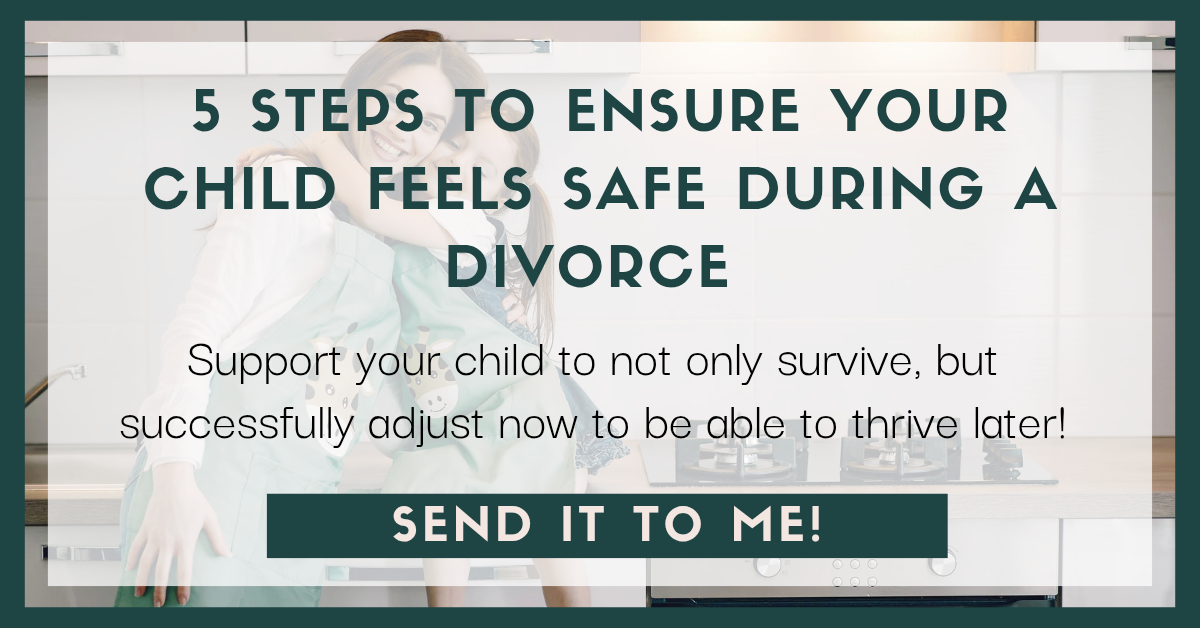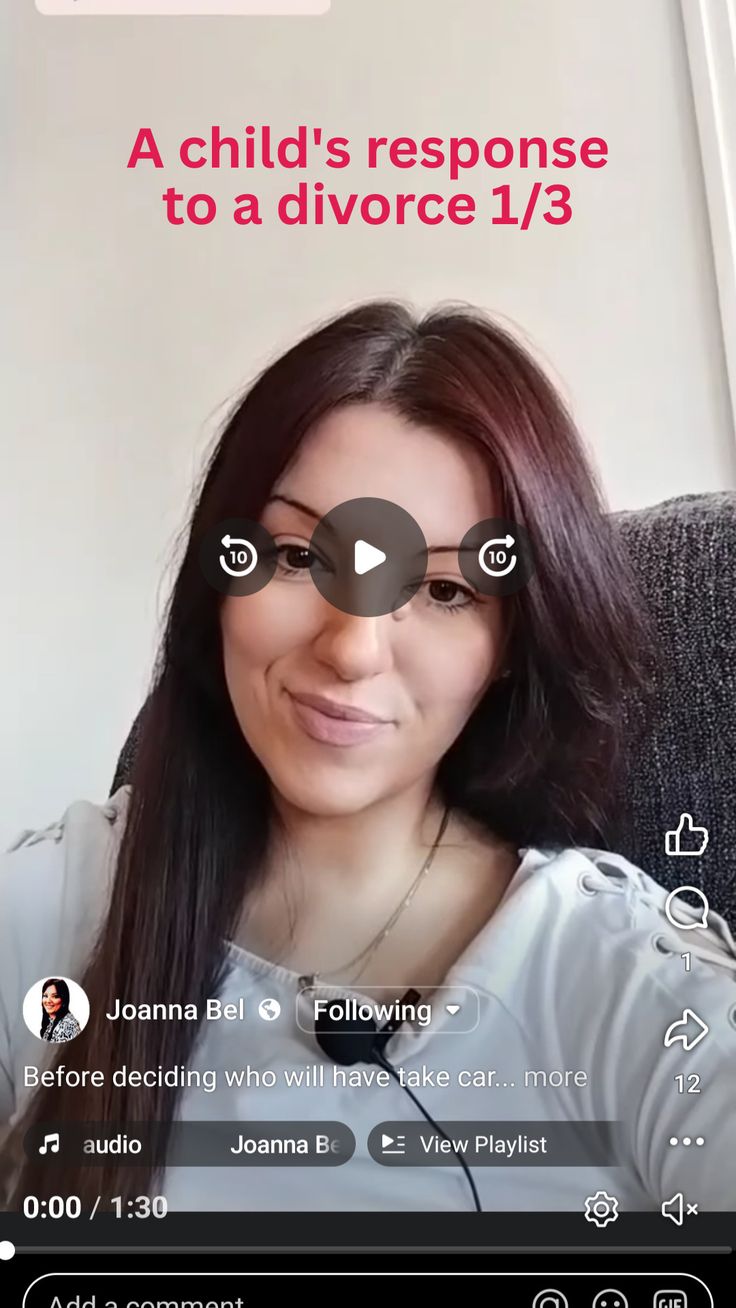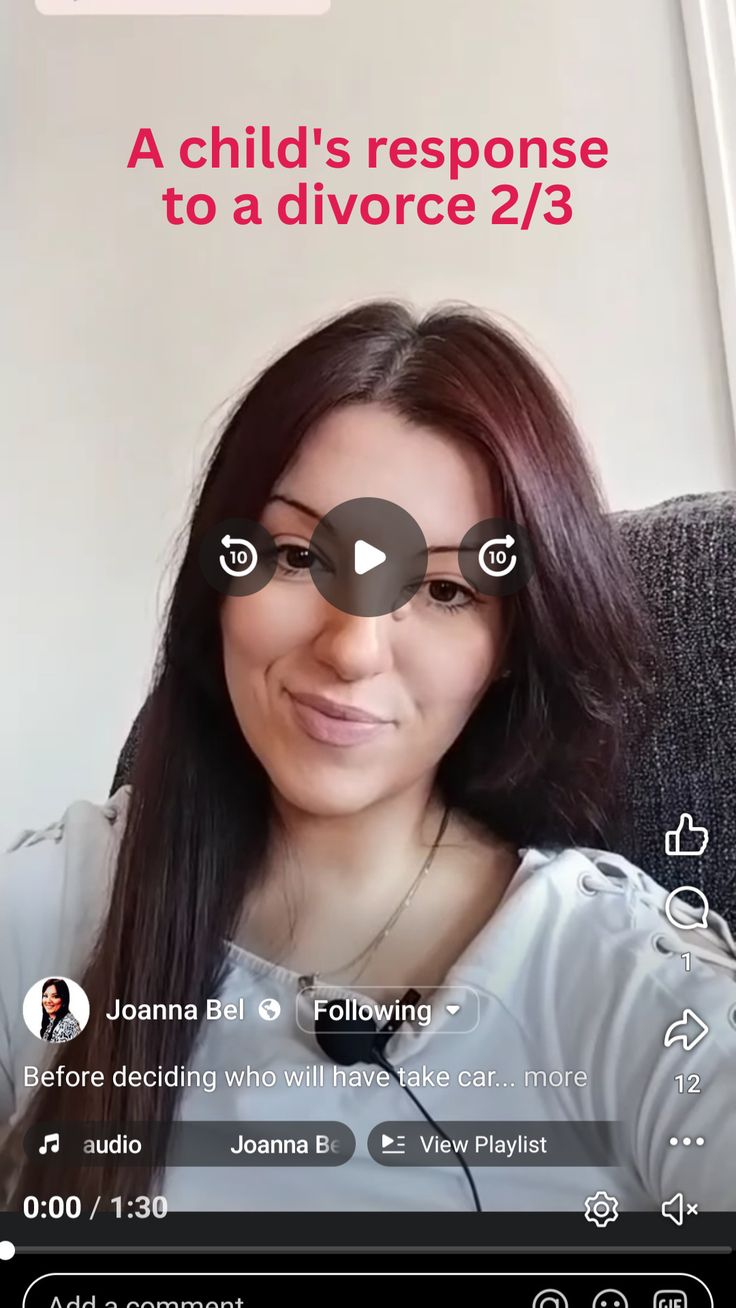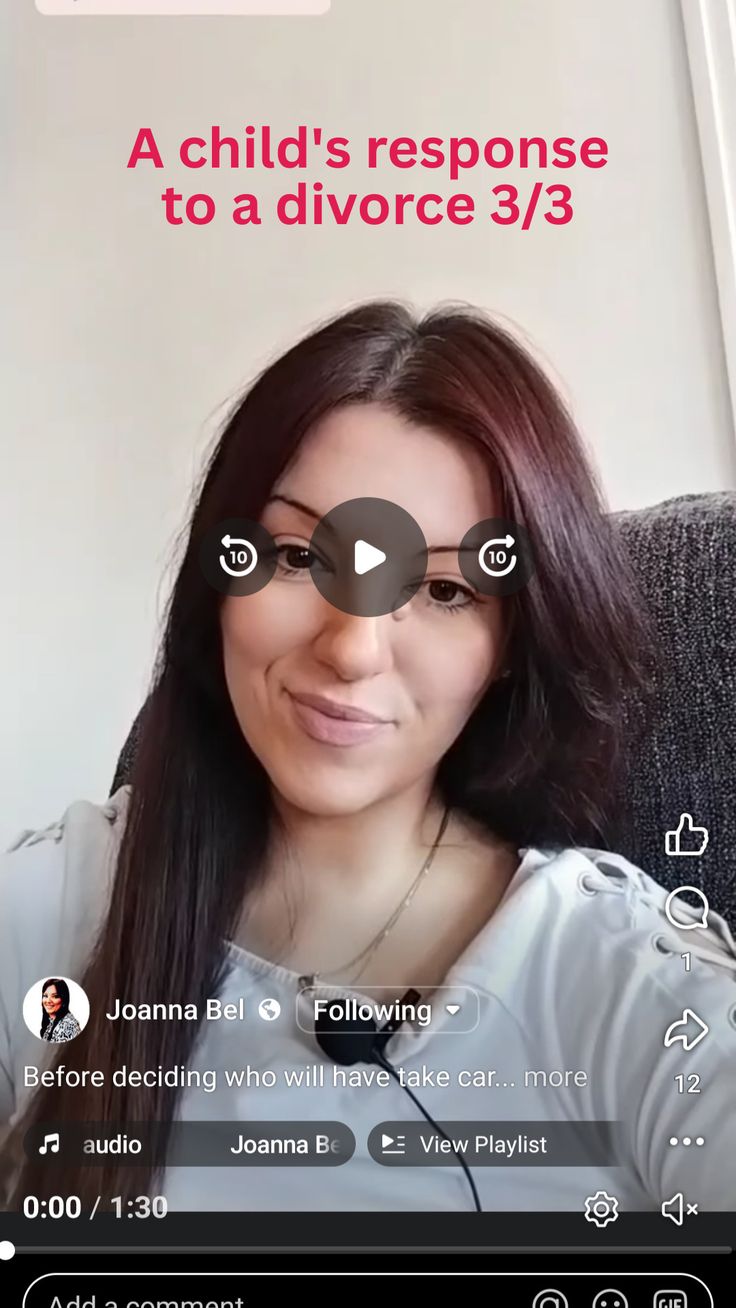Navigating the complexities of divorce is undoubtedly challenging, and its impact on children can be profound. This is why in this post, I’ll explore strategies and insights on how to make the divorce easier for the child.

How To Make Divorce Easier For The Child
Recognizing the importance of their emotional well-being, I’ll delve into practical tips and considerations to foster a supportive environment during this transitional period.
By helping you prioritize the needs and perspectives of the child, I aim to provide guidance for you who I know seeks to navigate divorce with sensitivity and understanding.
With this in mind, we can start exploring how you can support your child to navigate through the process of divorce.
Hi, I’m Jovana, a Clinical Social Worker. Everything I share is based on years of formal education, research, and practical experience working with a justice system supporting parents and children go through the divorce process feeling safe and secure – even when family dynamics change – making confident decisions pre, during, and post divorce.
HOW TO MAKE DIVORCE EASIER FOR THE CHILD

Navigating divorce with children requires a deep understanding of its impact on their lives.
Here you must carefully consider child custody arrangements, where you and other parties involved in the process need to take into account factors like parenting history, and everything else affecting the child’s overall well-being. The living arrangements post-divorce vary, and the choice between sole custody, joint legal custody and physical joint custody demands thoughtful consideration, as well.
Just like in case of living arrangements, structuring schedules of contacts between parents and children post-divorce also requires open communication and flexibility between parents.
At the same time, maintaining communication channels open with children becomes vital in the divorce process, since, as a parent, you hold the responsibility of addressing fears and concerns during the divorce, as a primary figure in your children’s lives.
Throughout this process that can become challenging, prioritizing the child’s best interests and overall well-being should guide your decision-making.
To give your child a sense of contol, which is the starting position on your path to securing their well-being, use my FREE 3-day mini crash course 5 Steps To Ensure Your Child Feels Safe And Protected During A DIVORCE. This will enable them to not only survive, but adjust successfully now to be able to thrive later. Click below to sign up:
5 STEPS To Ensure Your Child Feels Safe During A DIVORCE (adjusting now to thrive later)
Now let’s focus on the first non-negotiable if you aim to make divorce easier for the child.
1. LEARN HOW TO DIFFERENTIATE INTIMATE PARTNERSHIP FROM A PARENTING ROLE AND PARENTING CAPACITY
At times, this may be a tough task for parents, as separation and divorce are often emotionally draining and bring a lot of uncertainty and unfamiliarity.
On top of this, it comes with a lot of change and shifts, such as new living arrangements and new obligations (or their new forms).
Most importantly, divorce affects you in terms of emotional charges related to the ending of the intimate partnership, depending on the circumstances of your divorce. This may be conflicting, if you still can’t separate your ex-partner’s role as a parent from their role as your partner.
For some parents, this means that it’s hard for them to cooperate with their ex-partner regarding child care, as they have unmet expectations and/or unresolved emotional charges concerning the partnership.
If this is you, you should know that this isn’t unexpected, and you can move past it once you become aware of this and make a conscious effort to differentiate these two roles, as this is in the best interest of your child.
It’s important not tow resist this (even more) but rather to accept it and find ways to cope.
I’m not saying you need to approve of your ex-partner’s behavior or treatment. However it’s possible to deal with emotional charges and cooperate in order to find balance in meeting the child’s needs.
What’s important is to create routines and get into the habit of cooperation as soon as possible so that, over time, it can become easier, even effortless.
The fact is that you need to accept the situation for what it is first and start from where you are. The intimate partnership has ended, but the relationship with your ex-partner will not end because you have a child together.
This means that in theory there’s equal responsibility to take care of the child, provide for them, and be there for them as parents. (The structure will depend on the custody type and the new living arrangements).
Read: DIVORCE: WHAT IF A CHILD PREFERS ONE PARENT (HOW TO RESPOND).
2. EXPLAIN WHAT DIVORCE WILL MEAN FOR CHILDREN
First, make sure they comprehend the meaning of divorce, no matter how old they are (with the exception of infants(babies)).
The difference will be in the amount of details you provide as well as wording and how you phrase it so that they can understand what’s going on and what to expect from now on. But in no case should you hide the fact that divorce is occurring, except when the decision isn’t final.
In this case provide the information you can at that moment and tell them that you’ll come back with more details as soon as you know more.
You should talk about separation and divorce by giving enough information so that they feel like they have control over the situation instead of feeling confused, anxious, or frightened because they don’t know what is happening or what to expect.
For instance, they may wonder what’s going on with the other parent if they have begun to see less of them or don’t see them at all (in the case of safety concerns or life conditions that require restrictions on contact, such as domestic violence). And this is why you need to provide context for them.
It’s not necessary to give them too detailed information that may overwhelm them, just use your own discernment here on what’s essential; it’s enough to cover the basics just to instill certainty in them, unless they have more questions and concerns.
In any case, use age-sensitive language and details and make sure to NOT expose them to inappropriate content and activity, such as:
- talking about the other parent in a way that puts them in a bad light
- blaming the other parent for the ending of the marriage
- asking them to take sides
- blaming kids for the separation or divorce
- lying to them about the facts of divorce in order to present yourself in a good light or gain certain privileges
- manipulating them into developing conflicting emotions towards the other parent
- alienating them from the other parent
- denying them the right to information about the divorce by dismissing them, ignoring them and their questions and concerns; or by saying too much or too little that either overwhelms them or keeps them in unease (or adds a layer of anxiety on top of their current worries and doubts).
For more details check out my post: How To Talk To Your Kids About Divorce (3 Key Tips).
Paying attention to these things will make them feel safe. To continue down that route, take a moment to get access to my FREE 3-day mini crash course: 5 Steps To Ensure Your Child Feels Safe And Protected During A DIVORCE, Allowing Them To Adjust Successfully Now And Thrive Later. Sign up below:
3. ACT IN THE BEST INTEREST OF THE CHILD AT ALL TIMES
There is no doubt that it is easier said than done, as the term “best interest of the child” is indefinite and a little abstract. However, it can be briefly put as going for the most adequate option or action from the child’s standpoint.
This suggests that the child’s interests are separate from your interests (the child’s parents). And that in determining what the best interest of the child is, you need to look to find the best way to respond to the child’s needs. Not the needs of other parties involved, including you as a parent.
Naturally, this doesn’t imply that the child’s needs, interests, and rights aren’t linked to yours or in close relation to them.
What’s important here is to remain cognizant that the needs, rights, and interests of the child are separate from those of their parents.
Meanwhile as a parent in your relationship with your child, besides your rights, you have parental responsibilities and duties that don’t go away in a situation of divorce.
Now, in the case of divorce, there are different points in which you and other parties included (like institutions) in the process need to think thoroughly in terms of the child’s best interest, such as:
- living arrangements during and after separation (which one gives a good foundation for good parental cooperation and continuity in the contacts between children and their parents)
- regularity and continuity of contacts between children, their parents, and other important people in a child’s life
- child’s development and developmental stage, age, maturity, evolving capacity, and emotional needs
- participation of children in the process (expressing their views and taking part in the decision-making)
- safety concerns and ensuring safety (situations of separation and post-separation conflicts that undermine cooperative co-parenting)
- other specific circumstances, conditions, and characteristics of a child that may impact continuity of care, life arrangements, and stability.
4. ALLOW THE CHILD TO EXPRESS THEMSELVES FREELY AND INCLUDE THEM IN DECISION-MAKING ABOUT THE THINGS THAT AFFECT THEM (IN)DIRECTLY
Children can be included in the process in various ways depending on their age, maturity, characteristics, communication style, evolving capacity, choices, and willingness to take part in it.
So depending on the circumstances and the needs and characteristics of a particular child, the participation in the process may vary:
- some children will directly or indirectly be included in the decision-making about living arrangements and custody;
- other children will be expressing their views on what their needs are in the process; and
- the youngest children (under 2 or 3) will usually be included through observation.
As you can see, participation isn’t a matter of the choice of all adults included in the proceedings related to divorce (including institutions). Rather it’s an obligation (requirement) of theirs where they need to create proper conditions for children to take part.
This is about equality, where all parties are equally represented, valued, and respected to be given the opportunity to speak about their situation and present their position.
Now, there may be a few situations where children don’t need to take part in the proceedings, such as:
- when parents themselves have already talked with their children and discussed everything that’s important, heard their voices and points of view, and learned about their wishes
- when children firmly declare they do not want to be included, but in this concrete example, their statement on the matter of participation is a form of participation as they were given a chance to express themselves
- when children express intense fear and feel highly threatened by taking part in the process, but again, this is still a form of participation. (However, before concluding that this is how it is, it’s important to try to eliminate the sources of threat if this is something that can be done.)
It’s important to note that whichever adult is responsible for enabling child participation in the process and proceeding of divorce, their main task is to adapt the procedures to be able to meet children’s needs concerning participation.
This means that these adults need to think about the communication style that works for the particular child.
It also suggests that if the child is living with a disability that obstructs the common way of communicating, it’s critical to find ways to enable the child to express their views by making sure their voice is heard and valued.
It’s the same for small children, who are more comfortable with indirect, informal communication and play rather than formal questioning and direct questions.
Depending on the legislature, children’s views tend to have more or less influence on the final decision, as in some countries the age boundary for children to be ‘free’ to directly decide on the living arrangements and other aspects may vary.
Still, THIS DOESN’T MEAN THAT YOUNGER CHILDREN DON’T GET TO INFLUENCE THE DECISIONS or that older children are to be burdened with making decisions on behalf of adults.
It simply means that:
- we make an effort to include children in the processes that affect their lives in the most suitable way FOR THEM,
- we help them have their voices heard, and allow their views to be freely expressed, as this is a basic human right for all humans, including children.
Read: CHILD PARTICIPATION IN DECISION-MAKING (ENSURING EVERY CHILD’S VOICE IS HEARD).
If you found the information on the blog helpful & inspirational and you feel like giving back, you can do it by clicking the donate button after entering amount you’re comfortable with. I’ll use it to create and deliver more useful content and resources like this. Thanks for your precious contribution!
5. DON’T ASSUME CHILDREN FEEL AND THINK ABOUT DIVORCE THE WAY YOU DO AND ACT ACCORDINGLY
The quality of your marriage, in terms of how you see it, won’t be equal to how your child or children have experienced it. This means that even when parents were dissatisfied, children could have had good experiences and impressions.
Firstly, like we said, the intimate partnership between the two of you is separate from your parenting roles.
So since you look at your (ex-) partner through romantic lenses, you may incidentally merge these two separate impressions into one and conclude that, considering that your ex wasn’t a “good enough” romantic partner, they’re not a good parent either.
In reality, a parent can have a lacking parenting capacity or skills and be a good intimate partner, or vice versa; they may be a good parent but, for some/any reason, not a good partner to you.
Secondly, even though you know that your partnership is over and you’re at peace with this, your child won’t necessarily agree with you, as they want their parents beside them.
They may even actively work on bringing you two back together or try to prevent you or the other parent from moving on from this relationship.
Having this in mind, you don’t need to try to change your child’s mind. However, you can set certain boundaries/expectations and provide explanations for them to make sure they’re clear on where things are going.
And if you don’t have all the answers right now, it’s okay to be honest and say so while promising to inform them on this matter as soon as you know more. This will ease the tension and their anxiety, as it will give them a sense of control they seek at this moment.
Thirdly and finally, many children tend to hide their true feelings regarding the divorce and may try to portray that nothing bothers them.
They do this because they fear losing their parents (when the contacts with the other parent are reduced or discontinued) so that they don’t ‘lose you too’ if they behave in a ‘demanding’ way.
Some may sense that you have too much on your plate right now, so they don’t want to bother you even more.
At the same time, considering that divorce is usually emotionally draining for parents for various reasons, many of them cannot respond to the child’s emotional needs in the best way (understandably so).
Parenting capacity naturally weakens during and after separation, which may make parents:
- unable to recognize the child’s needs,
- unaware to what extent the needs are or aren’t met,
- fail to separate their own emotions from those of their child, and
- project their own needs onto the child.
With all of this in mind, it’s important that you:
- remain realistic about what you can or cannot do at this time,
- evaluate where you stand,
- keep the lines of communication with your child open at all times, and
- seek support when you need it.
Remember to remain kind and patient with yourself during this time, since being hard on yourself will only make things harder.
Read also: Can Divorce Be Good For A Child?
6. TAKE CARE OF YOURSELF SO THAT YOU CAN TAKE CARE OF THEM BETTER
This extends my previous point in a way, and it means that even though you might be burdened with many tasks and focused on giving your children everything they need, you can’t pour from an empty cup.
This means that you have to take care of yourself too, at least by making sure your basic needs are met. Create routines in order to structure your days so that you don’t skip over yourself.
By prioritizing self-care, you can better handle the challenges, make sound decisions, and provide the support your children need during this difficult time.
Additionally, taking care of yourself sets a positive example for your children on coping with stress and adversity.
All of this is easier said than done; however, take it day by day, hold space for yourself to improve over time, and this will get easier.
Plus, as the post-divorce period settles, your parenting capacity will get back to baseline, which will have a positive effect on everyone involved.
IF YOU NEED SUPPORT WITH:
- (pre)divorce and post divorce-related concerns and exercise of parental rights – be sure nothing you care about is left to chance and unaddressed, and get critical insights on the best practices for you which are suitable for your particular situation,
- effective and assertive communication around exercise of parental rights during or after a divorce that supports the child’s best interest – go through this process as easy as possible and with the least amount of challenge, setbacks, or throw offs,
- making sure you create as healthy and as supportive environment for your child as you (reasonably) can now that the family structure has changed.
USE A DISCOUNT CODE FOR A 25% OFF (active until August 31, 2025): Consultations25
If you’re not sure yet, here are some alternatives for your convenience:
Use a code available because your a reader of Joanna Bel blog: Divorce25 for a 10% off.
Not quite ready? No worries, I got you! Get my FREE 3-day mini crash course 5 Steps To Ensure Your Child Feels Safe And Protected During A DIVORCE, enabling them to thrive (not just survive) after successfully adjusting. Click below for a quick sign up:
5 STEPS To Ensure Your Child Feels Safe During A DIVORCE (adjusting now to thrive later)
Latest Posts:
- Special Gifts to Let Someone Know You’re Thinking of Them (13)

- 100 Ways to Challenge Yourself (Without Stretching Yourself Too Thin)

- What To Do When Your Parent Struggles With Alcohol

- How To Navigate Moving to a New Home With Your Kids

- Prenups for Young Couples (A Modern Approach)

- What Happens When You Sign A Prenup (Relationship-Wise + Legally)

FINAL THOUGHTS ON HOW TO MAKE DIVORCE LIGHTER FOR THE CHILD
Mitigating the impact of divorce on children requires a thoughtful and compassionate approach.
By acknowledging their emotions, involving them appropriately in decision-making, and fostering open communication, you can contribute to a more positive experience for your children despite the potential challenges of divorce and quickly understand how to make divorce easier for the child.
Remembering that each child is unique and adapting strategies to their individual needs is crucial.
Ultimately, with empathy and a commitment to prioritizing the well-being of the child, you can play a pivotal role in making the divorce process more bearable and facilitating a smoother transition for the entire family.
I hope you found this helpful and I’ll see you in my next post! Here’s one:

Note: Although I am a Clinical Social Worker, engaging with this website does not establish a professional social worker-client relationship. The information provided here is for general purposes only and should not be considered professional advice. While we strive to ensure accuracy and reliability, this content is not a substitute for professional guidance. For specific concerns, issues, or situations, it is essential to consult a qualified professional and present your situation. Read the full Disclaimer here.














Leave a Reply